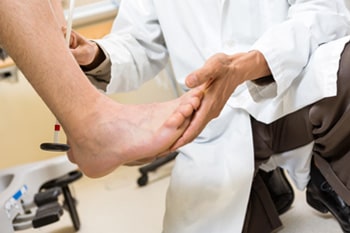Connect With Us
Basic Q & A's
Basic Podiatry Questions

If you have any general questions that you would like answered, please visit our Facebook page and message us with your questions, we will try to answer all questions submitted.
DISCLAIMER - We can not give any direct individual medical advice on our website or social media pages.
What is a Podiatrist? - A podiatrist is a doctor of the foot and ankle.
When should I call a podiatrist and make an appointment? - If you are experiencing problems with your foot or ankle that is not improving, you may need to see a podiatrist.
Why do Hammertoes form? - Very basically, a hammertoe forms due to an imbalance in the tendons on the top and bottom of your toes. The bottom tendon begin to pull harder than the top tendon and the toe curls down. This is often the case just due to the normal structure and use of our feet (our bottom tendons are stronger than our top tendons)
Is a surgical option the only option to fix a hammertoe? - To actually make the hammertoe go away, yes, surgery is the only option. However, other treatment options include padding, strapping, and shoe changes. These do not make the hammertoe go away, but they can help reduce the pain of the deformity which sometimes is more important.
When is a surgical option worth it to fix a hammertoe? - Surgery would be recommended only if you have tried other treatment options and the toe is still causing pain which is interfering with your normal, everyday activities.
How can I tell if I have an ingrown toenail? - An ingrown toenail just means the shape of the toenail is such that it is curved down at the side. A lot of people have ingrown toenails, but they do not bother them at all.
How can I tell if an ingrown toenail is infected? - An infected ingrown toenail occurs when the nail irritates the skin enough to allow bacteria to penetrate into the skin and cause an infection. Signs/symptoms of this include redness, swelling, drainage/bleeding, and pain.
What is Plantar Fasciitis? - Plantar fasciitis is inflammation of the plantar fascia, the ligament at the bottom of your foot that helps to hold up your arch when you stand and walk. It can become inflamed at any point in its course from your heel to the ball of your foot, but most commonly we see pain at the heel.
What is the best way to eliminate foot odor? - Most of the time, foot odor comes from bacteria being on your skin due to excess sweating. Make sure to change your socks daily and wear a moisture-wicking sock if possible. Make sure your shoes have plenty of time to dry out before you put them on again the next day.
Is there a cure for toenail fungus? - Sometimes. No anti-fungal medication is 100% guaranteed and even if the fungus goes away, you may still have long term damage to your nails which can give the appearance of a fungus even if it is gone.
Why are my feet dry and cracking? - Most often this is due to lack of moisture in the skin of your feet, however there can be other types of skin conditions that can cause dry skin as well, such as eczema.
Why do my feet burn when they are sweaty? - This is usually due to a skin fungus. There are many over-the-counter medications to treat skin fungus, but if the symptoms are not going away, a small scrape (no blood!) biopsy may need to be done to determine the cause of the itching and the correct medication to fix the problem
What is a bunion? - A bunion is a deformity of the big toe joint caused by an imbalance of the tendons and ligaments of the foot. Because we inherit our foot structure from our parents, they are often hereditary, however not always.
Is a surgical option my only option to relieve the bunion pain? - Surgery is the only option to FIX a bunion (ie. realign the joint), however if pain from rubbing is the only concern, padding is another treatment option that can help. Being conscious of the type and style of shoes you wear can also help reduce pressure on the bunion and reduce pain.
If my bunion doesn’t hurt, should I still look at a surgical option? - This is usually a personal preference, but cosmetic surgery for bunions is not common and often insurance companies do not cover it. It is often wise to also consider that, though temporary, surgery always causes pain, so if the bunion doesn’t bother you, you can actually make it worse feeling by doing surgery.
